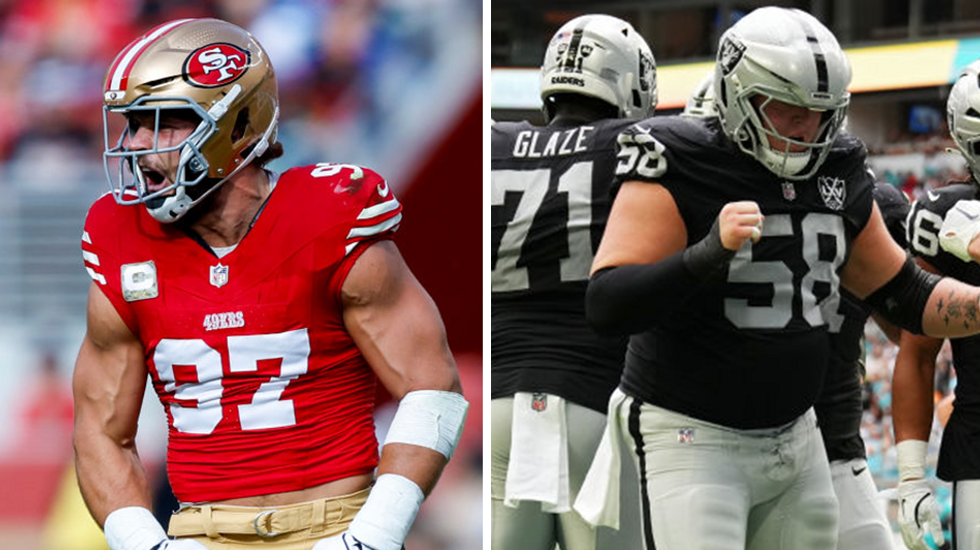How a beloved children's cartoon turns fathers into mothers — and what the Bible says about it
As the Western world catches collective amnesia around the profile of the historic father, we’ve begun to move past portrayals of fathers as the bumbling idiot of shows in the 1980s and 1990s to a new kind of engaged, empathetic, and present father. There’s only one problem with this new ideal father: He embodies almost all of the elements of the traditional mother, purged of the essence of elements from the historic father. The poster child for this new depiction can be found in the mega-popular kids program "Bluey." The dad, Bandit, is seen as a constantly nurturing, always-present playmate to his two daughters, Bluey and Bingo. He’s so present, in fact, that fans of the show often joke about when Bandit finds time to work, and in the show, it’s clear that the mother has less time to play than the dad. Our culture LOVES this depiction of fatherhood. It empties the father character of all the elements of the traditionally masculine father we’ve grown uncomfortable with, and at the same time, it provides freedom for the mother to get out in the world and explore her individual passions. Everyone wins, right? Well, it depends. God created the concept of male and female to create the kind of family that would maximize fruitfulness and multiplication and that over generations of collective effort would subdue and rule the created order. It depends on whether there’s an objective ideal of fatherhood and motherhood, and if there is, then symbolic depictions seeking to reverse these objective profiles are problematic. Embracing these kinds of portrayals, especially in a highly symbolic medium like in a cartoon, will go a long way in shaping our intuition around the essence of these roles. Now today, almost no one thinks there are objective ideals to these archetypes, and if they are right — and they personally resonate with the father, mother, and daughter depictions in "Bluey" — then everything I’m about to say will be dissonant and probably offensive. So let me say from the outset that, even in the conservative Christian world, my position is a tiny minority, maybe less than 1%. So feel free to stop reading if you’re getting triggered. Let me lay out three premises I believe about this topic, and if you disagree with any of these, you’ll likely disagree with my conclusion. Masculinity and femininity are not social constructs or primarily biological concepts but are family concepts designed to create a certain dynamic and to construct a highly functional multigenerational family team. The Bible presents meta descriptions of masculinity/fatherhood and femininity/motherhood through symbolic characters primarily rooted in the story of Genesis. Meta depictions of these roles are good and necessary to give culture at large something concrete to aim at even, though all of us as individuals will find some elements of these roles dissonant with our desires or even our innate wiring. I derive my first premise from the theological principle of first mention. When God created male and female, he actually revealed the purpose for gender, and that was to create a certain kind of family team. “So God created man in his own image, in the image of God he created him; male and female he created them. And God blessed them. And God said to them, “Be fruitful and multiply and fill the earth and subdue it, and have dominion over the fish of the sea and over the birds of the heavens and over every living thing that moves on the earth" (Genesis 1:27-28 ESV). God created the concept of male and female to create the kind of family that would maximize fruitfulness and multiplication and that over generations of collective effort would subdue and rule the created order. Genesis 1 does not yet give us content around the different male and female roles, only that male and female combine to achieve the purposes of the family. The second premise is that Genesis gives meta descriptions of the various parts of the family, and these meta roles can be seen in the Hebrew names given to the people. "Adam" = Man or Humanity "Eve" = Giver of Life But since we’re focusing here on fatherhood, the most important person comes when we meet a man named Abram. "Abram" = Exalted Father Abram is literally described in our language as a meta father. As he progresses in this role, his name is elevated again to Abraham, or father of many nations. One struggle that Greek-minded people often have is to think "meta" means ideal or model. Abram is not the perfect father. He’s the meta father. We understand the elements of how God interacts with both the specific father Abram and the concept of fatherhood through the Genesis narrative. I’ve learned that this idea is highly intuitive to people native to the Middle East but endlessly confusing to Western thinkers. That’s why of the three “Abrahamic religions,” Christianity is the one least influenced by Abraham’s depiction of fatherhood — and this is the West’s primary sourc


As the Western world catches collective amnesia around the profile of the historic father, we’ve begun to move past portrayals of fathers as the bumbling idiot of shows in the 1980s and 1990s to a new kind of engaged, empathetic, and present father.
There’s only one problem with this new ideal father: He embodies almost all of the elements of the traditional mother, purged of the essence of elements from the historic father.
The poster child for this new depiction can be found in the mega-popular kids program "Bluey." The dad, Bandit, is seen as a constantly nurturing, always-present playmate to his two daughters, Bluey and Bingo. He’s so present, in fact, that fans of the show often joke about when Bandit finds time to work, and in the show, it’s clear that the mother has less time to play than the dad.
Our culture LOVES this depiction of fatherhood. It empties the father character of all the elements of the traditionally masculine father we’ve grown uncomfortable with, and at the same time, it provides freedom for the mother to get out in the world and explore her individual passions.
Everyone wins, right? Well, it depends.
God created the concept of male and female to create the kind of family that would maximize fruitfulness and multiplication and that over generations of collective effort would subdue and rule the created order.
It depends on whether there’s an objective ideal of fatherhood and motherhood, and if there is, then symbolic depictions seeking to reverse these objective profiles are problematic.
Embracing these kinds of portrayals, especially in a highly symbolic medium like in a cartoon, will go a long way in shaping our intuition around the essence of these roles.
Now today, almost no one thinks there are objective ideals to these archetypes, and if they are right — and they personally resonate with the father, mother, and daughter depictions in "Bluey" — then everything I’m about to say will be dissonant and probably offensive.
So let me say from the outset that, even in the conservative Christian world, my position is a tiny minority, maybe less than 1%. So feel free to stop reading if you’re getting triggered.
Let me lay out three premises I believe about this topic, and if you disagree with any of these, you’ll likely disagree with my conclusion.
- Masculinity and femininity are not social constructs or primarily biological concepts but are family concepts designed to create a certain dynamic and to construct a highly functional multigenerational family team.
- The Bible presents meta descriptions of masculinity/fatherhood and femininity/motherhood through symbolic characters primarily rooted in the story of Genesis.
- Meta depictions of these roles are good and necessary to give culture at large something concrete to aim at even, though all of us as individuals will find some elements of these roles dissonant with our desires or even our innate wiring.
I derive my first premise from the theological principle of first mention. When God created male and female, he actually revealed the purpose for gender, and that was to create a certain kind of family team.
“So God created man in his own image,
in the image of God he created him;
male and female he created them.
And God blessed them. And God said to them, “Be fruitful and multiply and fill the earth and subdue it, and have dominion over the fish of the sea and over the birds of the heavens and over every living thing that moves on the earth" (Genesis 1:27-28 ESV).
God created the concept of male and female to create the kind of family that would maximize fruitfulness and multiplication and that over generations of collective effort would subdue and rule the created order. Genesis 1 does not yet give us content around the different male and female roles, only that male and female combine to achieve the purposes of the family.
The second premise is that Genesis gives meta descriptions of the various parts of the family, and these meta roles can be seen in the Hebrew names given to the people.
"Adam" = Man or Humanity
"Eve" = Giver of Life
But since we’re focusing here on fatherhood, the most important person comes when we meet a man named Abram.
"Abram" = Exalted Father
Abram is literally described in our language as a meta father. As he progresses in this role, his name is elevated again to Abraham, or father of many nations.
One struggle that Greek-minded people often have is to think "meta" means ideal or model. Abram is not the perfect father. He’s the meta father. We understand the elements of how God interacts with both the specific father Abram and the concept of fatherhood through the Genesis narrative.
I’ve learned that this idea is highly intuitive to people native to the Middle East but endlessly confusing to Western thinkers. That’s why of the three “Abrahamic religions,” Christianity is the one least influenced by Abraham’s depiction of fatherhood — and this is the West’s primary source of fatherhood confusion. Jesus, in one of his parables, referred to Abraham as “Father Abraham,” but — besides a particularly annoying youth group song — Christians do not think of Abraham through the lens of fatherhood. We see him more as an individual historic man of faith.
This lack of a symbolic depiction of fatherhood has untethered the concept of fatherhood and masculinity from anything objective and leaves us vulnerable to following the ever-changing depictions of fatherhood and masculinity invented by modern cultural sensibilities.
This brings me to my third premise and back to "Bluey."
I first heard of red flags in "Bluey" from my two teenage daughters, who watched an episode after hearing from so many Christian families who loved the show — and they immediately saw what was happening.
You might think that 'Bluey' is a wonderful depiction of fatherhood, but please don’t be naive about the power of symbolic depictions, especially ones aimed at children.
Their first statement was something like, “They treat their dad like a plaything.”
I then watched one three-minute clip on YouTube from a different episode and saw what they were so alarmed by.
There are hundreds of interesting elements of fatherhood that one can glean from studying how God interacts with the meta father (Abram), but I’m pretty sure Bandit is in no way tethered to this understanding of fatherhood.
And this tethering is not hard to do. When I’m in the Middle East, I see it everywhere. All the good and toxic depictions of fatherhood I see from those native to this region I recognize as coming from these Abrahamic stories. It’s increasingly hard to see in the Christian West.
We need to get into the details of the beautiful biblical balancing of the life-giving presence of motherhood and the training, territory expanding, and leadership of fatherhood.
But let me say one more thing that concerns me.
One reaction I’ve received is from people who think it’s absurd to criticize a cartoon. You might think that "Bluey" is a wonderful depiction of fatherhood, but please don’t be naive about the power of symbolic depictions, especially ones aimed at children.
We spend almost one-third of our lives experiencing symbolic depictions in our dreams, and most of our entertainment is created by watching stories filled with meta characters and what they symbolize. Symbols tend to bypass our conscious awareness and form our intuitions about the nature of truth and reality. These symbols include things like numbers, colors, animals, objects, shapes, and storylines. The Bible is full of these kinds of symbols, and most Western Christians are totally unaware of their power. When Jesus says things like “how many baskets did we pick up” after the feeding of the 5,000 and 4,000 and the disciples reply, "12" and "seven," he expected his disciples — and us — to immediately get the symbolic significance of what he did. But we don’t.
And in the same way, creating a daughter named Bluey using the color blue is totally lost on us. It goes right past our conscious awareness. If we do think about it, we think it’s cool that they’re reversing the gender stereotype of colors. We’re playing checkers with those who are playing chess, and we’ve been checkmated over and over again.
Editor's note: This essay was originally published by Jeremy Pyror on his Substack and was republished with permission.
Originally Published at Daily Wire, World Net Daily, or The Blaze
What's Your Reaction?
































































































